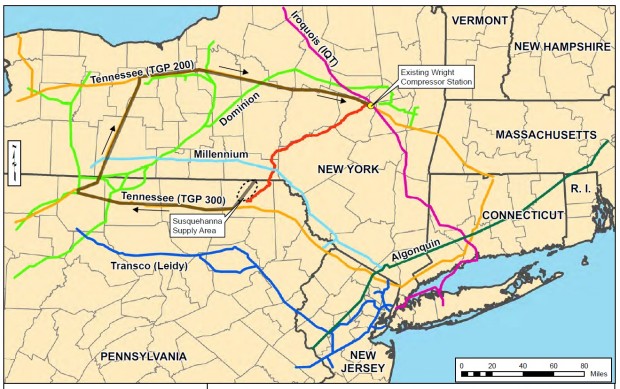Feds approve pipeline to bring Marcellus gas to New York, New England
-
Katie Colaneri

The dotted black circle shows the gas supply area in Susquehanna County. The red line is the proposed path of the Constitution Pipeline. FERC
The Federal Energy Regulatory Commission has given the green light to a proposed interstate pipeline that would bring Marcellus Shale natural gas to markets in New York and New England, provided it meets certain environmental conditions.
The Constitution project involves building 124 miles of new 30-inch-diameter pipeline, connecting gas production in Susquehanna County to existing transmission lines in New York. It would be operated by subsidiaries of Williams Partners, Cabot Oil and Gas, Piedmont Natural Gas, and WGL Holdings.
In an Environmental Impact Statement released in October, FERC determined the pipeline would have some limited, but adverse environmental impacts. The commission is requiring Constitution’s operators to submit numerous mitigation plans before construction to avoid impacts to sensitive areas and wildlife.
The project will also need final permits from Pennsylvania’s Department of Environmental Protection, the U.S. Army Corps of Engineers and the New York Department of Environmental Conservation.
Williams spokesman Chris Stockton said construction could begin by the end of the first quarter of 2015 and the pipeline could come online by the end of next year.
However, that timeline could prove to be overly optimistic if environmental groups and landowners in upstate New York opposing the pipeline decide to challenge these permits in court.
“We’re doing everything we can and working hard to get everything lined up,” Stockton said.
While developers say the Constitution pipeline will keep customers in New York and New England from experiencing sticker shock when they get their gas bills next winter, these projects have gotten pushback from those who argue there is little benefit to local communities – especially in Pennsylvania.
“These pipelines and transmission lines have an impact on Pennsylvanians,” said PennFuture President Cindy Dunn. “They have virtually no say in it and no benefit and that’s a problem.”
For example, Pennsylvania doesn’t charge property tax on pipelines, while neighboring New York state does.
According to a study by the project developers, the Constitution Pipeline will pass through four counties in New York that will rake in a combined $12.7 million each year in tax revenue. Susquehanna County will receive only $250,000 in property taxes on a metering station for the line.
However, Tony Ventello argues Pennsylvania isn’t getting the short end of the stick.
Ventello is with the Progress Authority, an economic development organization in Northeast Pennsylvania where the Constitution Pipeline will start.
“It starts with the wells. You’ve got plenty of taxes being paid by the industry to develop the wells,” he said. “They’re buying products in Susquehanna County. There’s a lot of impact to businesses just building that line directly.”
















